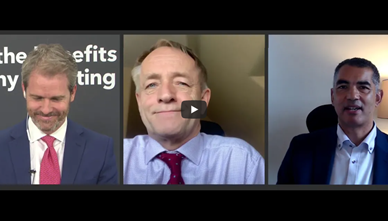Ben Needham: "We are not cabbage farmers and nor do we want to be!"

Ever wondered what cabbage farmers and investment portfolio managers might have in common?
Much like a good investor, a farmer only grows crops that they think they can grow well whilst keeping a healthy crop rotation too. If, for example, the soil on their land is not right for growing cabbages - and neither do they have the tools or expertise to do so – then they don’t do it.
When a farmer across the river has a good year because the cabbage price is high, does the farmer who doesn’t grow cabbages really care? I think the answer to that should be ‘no’.
Similarly, I think as investors we have expertise and tools which make us better at picking certain stocks/sectors than others, i.e. stocks within our circle of competence. Over time we do try and grow that circle of competence as it would be ignorant not to do so. Having covered a variety of sectors, however, I would label the oil & gas sector as a cabbage. There are a lot of unknowns but what we do know is that many of the desirable business, financial and capital allocation traits we look for are not typically exhibited in these companies.
Do not grow cabbages just because your neighbour does
Structural growth is a tough gig
For instance, to really grow an arable farm you have to acquire land which can be costly in real terms (depending on when you invest in the cycle and/or how opportunistic you are) and expanding acreage is further complicated by the need to acquire immediately adjoining fields in order to get economies of scale. As a result, farms will typically have the same acreage for very long periods of time, meaning growth is reliant on improving crop yields (which is difficult itself due to the unpredictability of the weather) and a resurgence in commodity prices.
Costs can be as low as possible and earnings can be negligible in a very bad year (when commodity prices are close to the cost of production) or very good (when commodity prices are meaningfully above the cost of production); over the course of a decade earnings might not make new highs due to the heavy revenue reliance on externalities.
This is a similar theme for BP as proved by its adjusted EPS over time. The cost of growth is the opposite to capital light businesses within our portfolio such as AJ Bell which barely have any incremental cost to process new flows, especially from existing clients, whilst also having the luxury of being positioned in the UK savings industry, which is a structurally growing market (and not reliant on year on year changes in commodity prices).
A structurally lower cost base is key
This demands commodity companies adequately reinvest in their businesses in order to structurally lower their cost base and operate at the lower end of the cost curve. As an aside, this is the real attraction for our recent investment in Mondi, which operates in the first and second quartile of the paper and packaging cost curve, ensuring a reasonable through cycle return on capital.
The same concept is also true for why our team prefers Ryanair in the airline space, JD Wetherspoons in the pubs space, Cranswick in the pork and poultry space, Compass in the food outsourcing space and Charles Schwab in the US platform space.
Using scale to reinvest in price can provide a healthy flywheel dynamic which we observe across many of our holdings but unfortunately, we cannot make these arguments for UK big oil. This is particularly the case when one considers the meaningfully superior cost base of Saudi Aramco.
Capital allocation is equally important
Given the difficulty in growing your volumes/yield, successful farmers not only need to be good at growing their crops and the support of favourable commodity prices, but also need to be mavericks when it comes to reinvesting, i.e. invest counter cyclically.
Buying another farm when farmers’ incomes are low due to unforeseen commodity price headwinds is usually an astute strategy, albeit one that requires patience and a build-up of capital before the event.
Pre-2020, the oil companies were not hoarding capital but instead were levering up in order to feed unsustainable dividends. It is encouraging to see their dividends have since rebased to more sustainable levels, but I personally think the lack of counter cyclical investment is still one of the most disappointing observations when I look at the oil & gas sector. 2020 was a great opportunity to allocate capital for growth but their balance sheets would not allow it to happen, and instead pro cyclical retrenchment, positively correlated to the fall in the oil and gas price, ensued. I would welcome counter-cyclical investment in this sector.
In summary, for all of the above reasons we continue to avoid big oil.
To find out how the UK banking space has many comparable dynamics to the oil & gas sector read the full report here. In short, it covers:
- Valuation and inflation risks are not a 2021 thing. They are permanent fixtures when making an investment decision which is why we are sticking to our knitting in how we approach income investing.
- The VitalityInvest Ninety One UK Equity Income Fund will continue to avoid certain stocks or sectors which do not have the Quality attributes that we seek. As discussed in the piece, we happily avoid cabbages.
- We touch on some of the core attributes that we look for, ranging from structural growth potential, an efficient cost base and counter-cyclical capital allocation strategies, and explain why certain stocks within the banking and other commoditised sectors still do not meet this criteria.
- We continue to believe that UK equities look relatively attractive across the board and are cautiously optimistic of the forward return potential for the UK Equity Income Fund; many of our holdings have used the pandemic to strengthen their market positions, bringing lasting future benefits as opposed to temporary ones.
This is not a recommendation to buy, sell or hold a particular security. The portfolio may change significantly over a short space of time.
VitalityInvest is a trading name of Vitality Corporate Services Limited. Vitality Corporate Services Limited is authorised and regulated by the Financial Conduct Authority. 17/03/2021 | This article’s view is based on the law, practices and conditions as at the day of publication. While we have made every effort to ensure they are accurate, we accept no responsibility for our interpretation or any future changes.
Where to next?
-
How macro dynamics are shaping the invest future
An expert panel discusses current market conditions and reviews the macro, global dynamics that are shaping the future investment environment.
-
Income investor challenges in a COVID-19 world
John Stopford shares his views on the challenges and opportunities facing income investors as a number of companies cut, cancel or suspend dividends.
-
Insights Hub
Our Insights Hub brings you our range of adviser content - from video series to articles & blogs.


